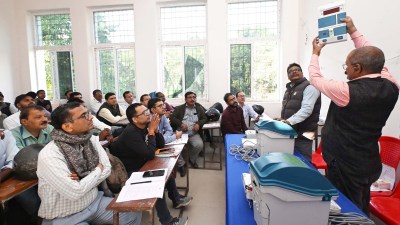Womens Bill: Critics cite Sachar to push Muslim quota,but he is opposed
Justice Rajinder Sachars report highlighting the abysmal plight of Muslims is being used by several leaders and groups to argue for a Muslim sub-quota in the Womens Bill....
Justice Rajinder Sachars report highlighting the abysmal plight of Muslims is being used by several leaders and groups to argue for a Muslim sub-quota in the Womens Bill. Few have checked with Sachar he is strongly opposed to such a move.
Strongly endorsing the Bill as it is, Sachar trashed demands for a sub-quota for Muslims or OBC women. I think the Bill should be brought to the Lok Sabha straightaway. It makes no sense to ask to divide women up into different categories. I firmly believe that increasing women participation in Parliament will clarify muddy politics and decriminalize it, he told The Indian Express today.
Those who are in Parliament because they are OBCs or Muslims arent there for the great social work they have done but because of the caste composition. Now that wont get diluted because women will come in. Women of that caste will come in. Those who oppose this view can debate why in the Lok Sabha. My view is that Muslim women will leave their male counterparts behind,they are very capable,they will prove to be superior to the Muslim male. I have no doubt about it, he said.
Muslim fears, however,could have a basis,says Tahir Mehmood,the key person behind the National Commission for Religious and Linguistic Minorities also known as the Ranganath Mishra Commission which recommended reservations for minorities in education and jobs. Maybe Muslims are fearful that,already,for the Dalit seats,reservations have been made specifically in areas where Muslims are in substantial numbers,often 50% or more. So no Muslim can get elected from there as Dalit Muslims arent recognized as such. The apprehension is that with womens reservation,the total number of such fixed seats will further squeeze chances for Muslims to get elected.
Sachar and Mehmood reflect the spirited debate in the Muslim community on the Womens Reservation Bill and their political representation. Significantly,Muslim women have a markedly different view from Muslim men.
Says Azra Razakh,a hijab-wearing educationist working on identity and education at the Centre for Dalit and Minorities Studies in Jamia Millia Islamia: Muslim men are perhaps a little scared about how things will turn out once women step out into the open and enter public life. There are so many examples at the grassroots I know of,where Panchayats and village bodies already have reservation. In Tamil Nadu,there is D Sharifa,who has taken on the Jamat. There is a dominant male view which wants to confine women to homes but there are many women quietly defying that. I am the first secretary of the Delhi Education Society,we run three schools in old Delhi. I have watched the response to me change slowly and now I am accepted.
Syeda Hameed,Member,Planning Commission says: If this goes through,with 181 women to be elected,there is no way Muslim women will be left behind. The quota within quota is a way of trying to scuttle a bill,since the time of Geeta Mukherjee. Prophet Mohammed would have been very thrilled with the Bill,offering seats to women in the highest decision making body in the country. It is completely in keeping with the tenets of Islam,which a section of the men have always tried to subvert. And these leaders making statements about Muslim women being left behind now,why didnt they ever give Muslim women a single winnable seat so far?
But Maulana Khalid Firangimahali,a member of the All India Muslim Personal Law Board based in Lucknow,echoes fears about reducing Muslim representation in politics. This is a conspiracy to ensure that there is a bigger pool to reserve. The Muslim-dominant areas will be fixed for either Dalits or women. And our women,the ones from sharif gharanas at least,dont believe in coming out so will just not be able to make it. The men somehow make it but our women are confined to homes. How will they match those from other communities?



- 01
- 02
- 03
- 04
- 05




























